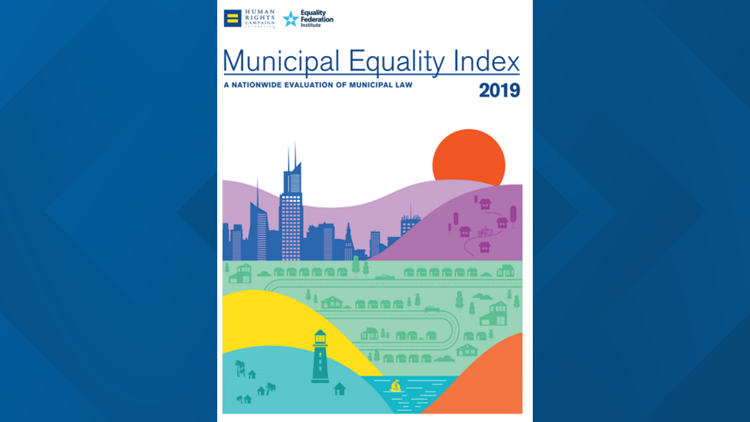KNOXVILLE, Tenn. — The Human Rights Campaign released its annual equality index within the U.S., lauding 'historic progress' within municipalities for the health, rights and welfare of LGBTQ people.
The Municipal Equality Index ranks cities on how inclusive its law and policies are to protect against discrimination, as well as other areas such as hate crime reporting and the relationship between law enforcement and the LGBTQ community.
The report does not rank a city's atmosphere or quality of life, and said high-scoring cities may not 'feel truly welcoming' for all LQBTQ people, and some low-scoring cities 'may feel more welcoming than their policies reflect.'
The national city average for LGBTQ equality is 60 points, up from 58 last year. This year, the organization said it had 88 perfect-scoring cities -- the largest it's ever seen.
Knoxville met the national average, scoring 60 points on the index. The city earned full marks for law enforcement, but no marks for non-discrimination laws. The report said Tennessee law prohibits cities from passing non-discrimination ordinances, though.
"Cities with a dedication to equality that are in Virginia, Tennessee, and North Carolina, for example, will never be able to score as well as cities with comparable dedication to equality that exist in states without the restrictive laws," the report said.
Nashville was ranked as the most LGBTQ inclusive city in Tennessee at 70 points.
The state as a whole earned 35 out of 100 points. Three of the state's cities received 12 points: Johnson City, Franklin and Murfreesboro.
The index scored regions based on four factors. First, it considered the extent of citywide protections for LGBTQ people. This factor examined whether a region enacted non-discrimination ordinances and whether the region protected LGBTQ people against harmful practices such as conversion therapy.
Secondly, the index scored cities based on whether the city offered inclusive workplace policies. The third factor examined whether Transgender-Inclusive Health Care Benefits were available for people. The final factor was scored by the amount of LGBTQ representation there was in the city's government.



